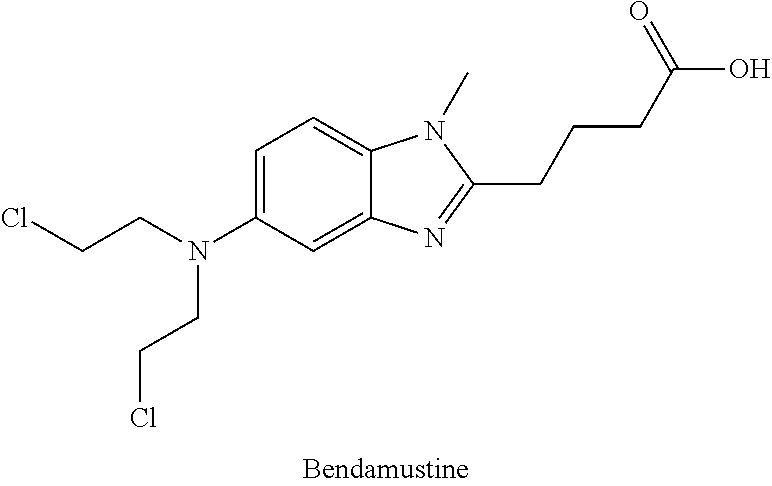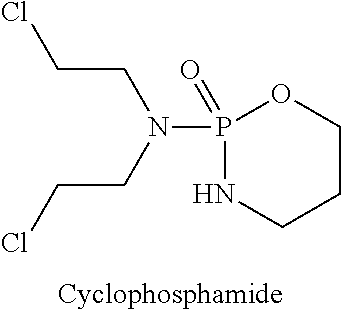Hydroxamic acid derivatives
a technology of hydroxamic acid and derivatives, applied in the field of hydroxamic acid derivatives, can solve the problems of significant cost in the united states, significant side toxicity, and limited clinical use of cancer, and achieve the effects of increasing the solubility, stability, and/or bioavailability of pharmaceuticals
- Summary
- Abstract
- Description
- Claims
- Application Information
AI Technical Summary
Benefits of technology
Problems solved by technology
Method used
Image
Examples
example 1
[0144]The hydroxamic acid derivatives with P represented by
[0145]
were synthesized according to the synthetic scheme below.
[0146]
[0147]Step 1: A mixture of starting material 6-methylpyridin-3-ol (30 mmol), ethyl 7-bromoheptanoate (30 mmol) and potassium carbonate (100 mmol) in DMF (80 mL) was stirred at 60° C. for 3 hours. After reaction the mixture was filtrated. The filtrate was concentrated in vacuo and the residue was dissolved in dichloromethane and washed with brine twice. The organic phase was dried over sodium sulfate, filtered and concentrated to give (2).
[0148]Step 2: The freshly prepared hydroxylamine solution (60 mL, 220 mmol) was placed in 100 mL flask. Compound (2) (20 mmol) was added to this solution and stirred at 25° C. for 24 hours. After reaction the mixture was neutralized with acetic acid, and the resulting precipitate was isolated, washed with water, and dried to give the title intermediate (3).
[0149]Step 3: K2PtCl4 was ground into a very fine powder with a mort...
example 2
[0154]The hydroxamic acid derivatives with P represented by
[0155]
were synthesized according to the synthetic scheme below.
[0156]
[0157]Step 1: To a solution of the starting material (1) (20 mmol) in diethylether (60 mL) at 0° C. ethylchloroformate (24 mmol) and N-methylmorpholine (26 mmol) were added and the mixture was stirred for 10 min. The solid was filtered off and the filtrate was added to freshly prepared hydroxylamine (30 mmol) in methanol. The reaction mixture was stirred at room temperature for 15 min. The solvent was evaporated to obtain the final product with a purity of at least 99% area by HPLC.
[0158]Step 2: An aqueous solution of K2PtCl4, (20 mmol) was treated with KI (200 mmol) and stirred for 10 min at room temperature. Two equivalents of intermediate (2) was added dropwise to the resulting K2PtI4, solution. Upon stirring for 30 min, the yellow precipitate was filtered and washed extensively with water. The precipitate was recrystallized from the DMF / H2O mixture. Aft...
example 3
[0164]The hydroxamic acid derivatives with P represented by
[0165]
were synthesized according to the synthetic scheme below.
[0166]
[0167]Step 1. (Synthesis of 2) Aqueous NaOH (20 mmol) was added to 10 mmol of the 1 dissolved in a small quantity of water. 20 mmol of AgNO3 was then added to the sodium dicarboxylate solution in the dark. A white precipitate formed immediately. The mixture was stirred for 15-30 min and the silver compound 2 was filtered, washed with water, dried in air and finally in a dessicator.
[0168]Step 2. (Synthesis of 3) Compound 2 and 5 were mixed together in water in a 1:1 proportion. The mixture was stirred in the dark during 2-3 days until the formation of AgI was complete. The yellow precipitate was filtered out and the filtrate was evaporated to dryness.
[0169]Step 3. (Synthesis of 4) To a sonicated solution of 3 (1 equiv.) and iodide 6 (2 equiv.) in aqueous EtOH (70% v / v) was added CuI (2 equiv.) and Zn (6 equiv.). After a few minutes, more aqueous EtOH (70% v / ...
PUM
 Login to View More
Login to View More Abstract
Description
Claims
Application Information
 Login to View More
Login to View More - R&D
- Intellectual Property
- Life Sciences
- Materials
- Tech Scout
- Unparalleled Data Quality
- Higher Quality Content
- 60% Fewer Hallucinations
Browse by: Latest US Patents, China's latest patents, Technical Efficacy Thesaurus, Application Domain, Technology Topic, Popular Technical Reports.
© 2025 PatSnap. All rights reserved.Legal|Privacy policy|Modern Slavery Act Transparency Statement|Sitemap|About US| Contact US: help@patsnap.com



